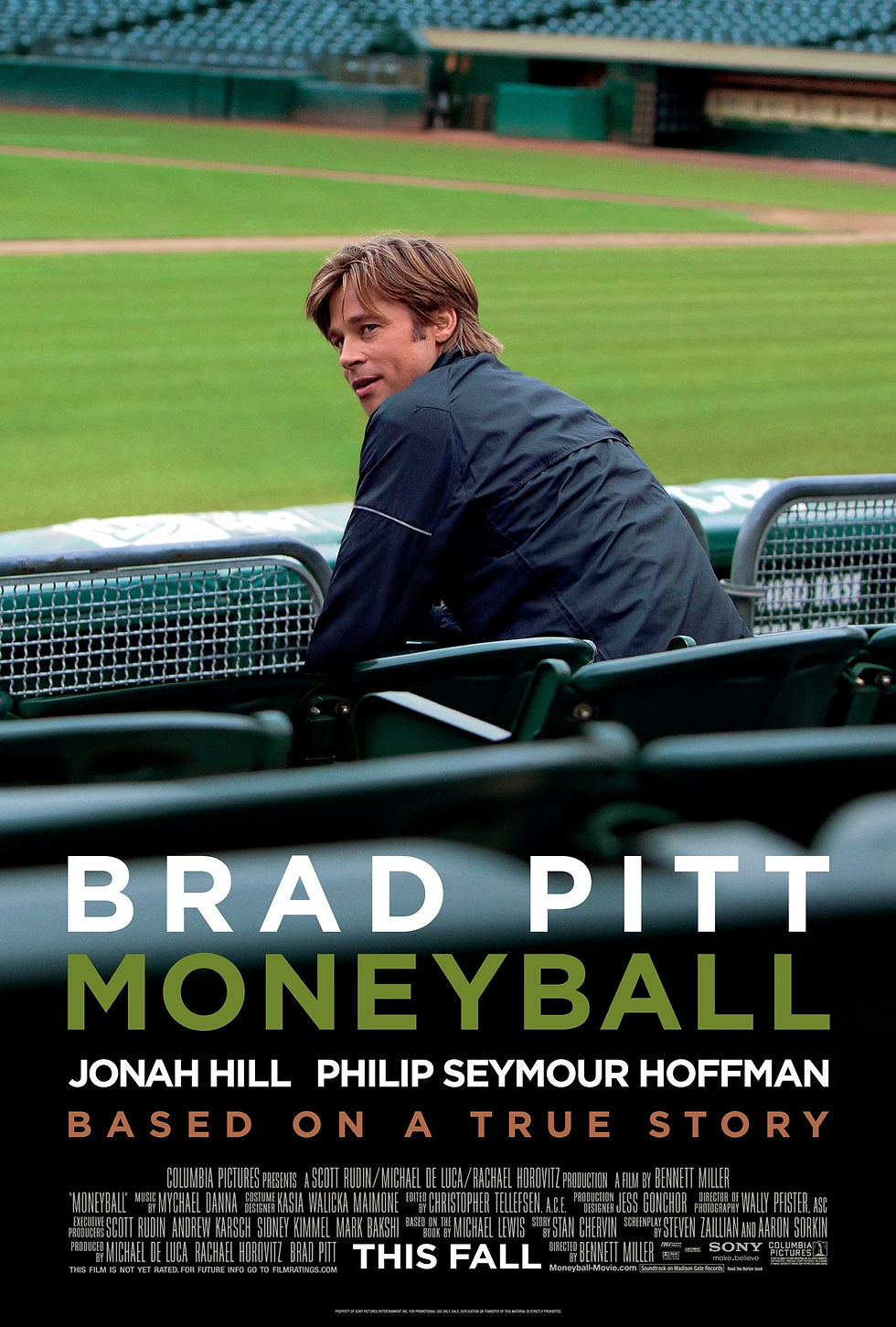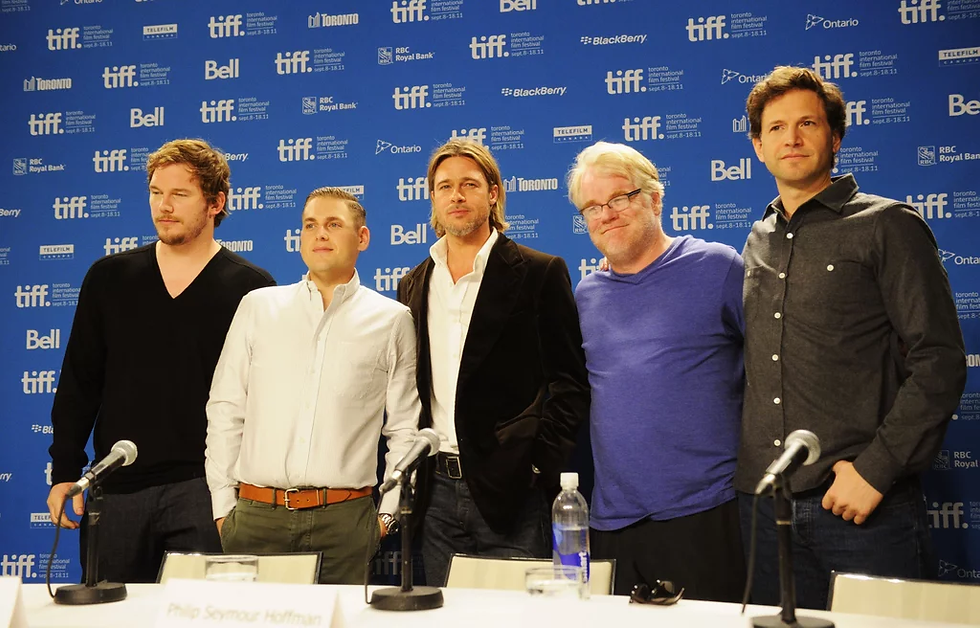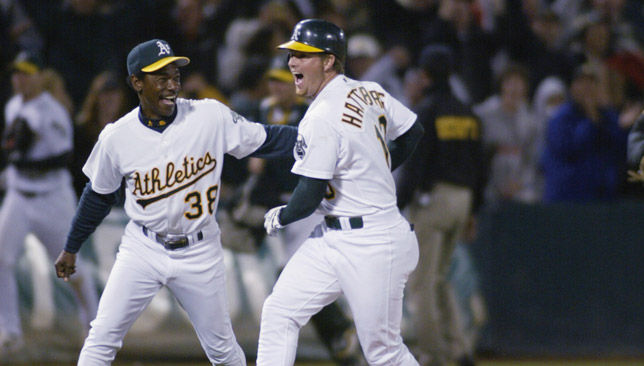Moneyball Review: The Greatest Baseball Movie of All Time
- Steven Cohen

- Aug 12, 2022
- 19 min read

Baseball is a complicated sport to understand. From the rules to the statistics, baseball is a sport that is hard to figure out but if you do and when you do then you will know how special of a sport it is. Baseball is my favorite sport of all time. I religiously watch it, play it in video games and from time to time on the field, but most of all I religiously talk about it. Baseball is my 2nd favorite form of entertainment in the world, next to movies. Baseball and film put together is a match made in heaven as film making is a complicated thing to do but once you figure it out it becomes special and you begin to appreciate it more, especially behind the scenes. The same can be said with baseball as while we watch 2 teams battle it out for a win each night, we never give recognition to what goes on behind the scenes of the sport and especially for the team. Now not many baseball movies make a big deal about what goes on behind the best teams of the league in certain years. There have been many great baseball films including The Sandlot, Major League, Field of Dreams, Sugar, 42 and The Pride of the Yankees, but none of these films teach us the behind the scenes of baseball aka the making of a great ball club but also the struggles a team deals with when they are the outcasts of the sport and have the lowest payroll in all of MLB. I have been meaning to review this film for a long time because I fell in love with the film the 1st time I watched it and became more in depth in paying attention to stats when choosing the best players in fantasy baseball or when creating a team of my own one day. I fell more in love with baseball thanks to this movie and this movie became one of my favorite films of all time; not because it was a movie about baseball but because it was a passionate film about a baseball team that defined the game, changed the game and most of all became one of the most iconic teams in the history of the sport. Moneyball changed my life forever and I want to finally review it. So let me finally talk about Moneyball: The Greatest Baseball Movie of All Time.
*SPOILER WARNING AHEAD*
Now before I go on to review this film I want to first mention that yes this film is about the 2002 Oakland Athletics but the film is based off a book by Michael Lewis called “Moneyball: The Art of Winning an Unfair Game. That book was about Billy Beane and the 2002 Oakland A’s so in case many people didn’t know this fact well I guess now you do. Also there is going to be a lot of baseball talk in this review so if it is very long I apologize ahead of time but in order to understand the film you kind of need to understand the game and the math/science/physics of baseball. I say math, science and physics of baseball because all of these subjects play a big part of this film but also the game. I will explain this vaguely later on but let’s first introduce our film.

Moneyball was directed by Bennett Miller, a man who kind of needs a proper introduction because he doesn’t get much love in the film industry. He has directed only 3 theatrical films but all three have been nominated for Best Picture in the Academy Awards. These films include Capote (2005), Moneyball (2011) and Foxcatcher (2014). Not a bad line up of films to have in your resume but while the film’s direction was great, the screenplay was phenomenal. Steven Zaillian was one of the two screenplay writers for this film and well he has himself a pretty great resume himself. Gangs of New York, Schindler’s List, Awakenings, The Irishman, yeah this man has plenty of great work but then there is Aaron Sorkin. A Few Good Men, Molly’s Game, The Trial of the Chicago 7, The Social Network….oh yeah and Moneyball. All three men together created a masterpiece with Moneyball and they wouldn’t be anything without their amazing cast. The cast includes Brad Pitt (Billy Beane), Jonah Hill (Peter Brand), Phillip Seymour Hoffman (Art Howe), Chris Pratt (Scott Hatteberg), Stephen Bishop (David Justice), Robin Wright (Sharon Beane), Reed Diamond (Mark Shapiro), Ken Medlock (Grady Fuson), Brent Jennings (Ron Washington), Kerris Dorsey (Casey Beane), Spike Jonze (Alan) and Arliss Howard (John W. Henry). While this isn’t the most star studded cast, next to Pitt, Hill and Hoffman of course, this film somehow managed to make this cast feel like they were actually playing the real life characters they were playing. Sure a couple of moments in the film were played out dramatically to make the event seem more dramatic than they really were, all biopic films do it so it’s not the only one, but it does it in a way where you are rooting for these characters and want to see them win. The screenplay done by Zaillian and Sorkin is phenomenal as you can feel the passion in the dialogue and thankfully you found the right cast members to say these lines of dialogue and put on performances that are honestly underappreciated because everything else around it is a masterpiece. The musical score is intense as while you constantly hear the same notes multiple times throughout the film it doesn’t ruin the film as these same few notes you do hear strengthens the films integrity and its story. The cinematography and editing in this film is also incredible. While this film does have shots of the actors playing on the baseball diamond, it mostly uses footage of the 2002 Oakland Athletics season within certain scenes. We mostly see it through television screens but it still strengthens the film as well this film might be about baseball but it’s more about the behind the scenes of the sport.

Baseball is a fun sport to play and even watch but in order for teams to have certain players they need to have money and in 2002 Oakland only had a $39 million dollar payroll, last in MLB, while the Yankees had $114 million, the most in MLB. Oh yeah this is the part of the review where we are going to have baseball talk so if you don’t like it then well Mulan 2020 review is available to read instead. Anyway, the Oakland A’s were losing 3 of their best players, 2000 AL MVP Jason Giambi, Johnny Damon and a young fireball throwing relief pitcher Jason Isringhausen. Isringhausen signed with the Cardinals for 4 years/$27 million dollars, Damon signed with the Red Sox for 4 years/$31 million and Giambi signed with the Yankees for 7 years/$120 million. 2002 all three of their salaries together were 27.6 million dollars. Oakland would have had to use 3/4th of their payroll to be able to afford one of them, but in reality Oakland couldn’t afford either of them as they were all worth too much for their payroll. The thing about baseball is well in order to win championships you either can form a team with the young talent you have in the farm system or you buy your championships and well the 2nd one is pretty much why the 2002 Oakland A’s, the novel about this team and film based off the novel about this team, was created. Moneyball is a term describing baseball operations in which a team endeavors to analyze the market for baseball players and buy what is undervalued and sell what is overvalued. Billy Beane pretty much in this film and in real life knew that he couldn’t afford to bring back all three, let alone one of his top 3 players on the 2001 Oakland A’s, with the payroll he was being given. So his solution was simple, bring in guys who are underappreciated and undervalued but still worth a pretty penny and be able to form a team of misfits and social outcasts and win a championship ring that way. In order to compete with the Yankees or the Red Sox or the Cardinals or pretty much all of baseball, Billy Beane had to change the way the game is played and formed and he needed help so he found Paul DePodesta, better known as in this film as Peter Brand. But why you may ask? Well Brand/DePodesta believed in the method of assessing player value by looking at certain statistics and seeing how much a player is worth based on their statistics. This method was also used by Bill James, a man who wrote a book about baseball and determined why teams win and lose by using the value of a player with their stats but also sabermetrics. Sabermetrics is the empirical analysis of baseball, but mostly measurements of in game activity. So you have your mathematics of the game behind the scenes with creating a ball club, your physics with measurements of in game activity and how the player/team is playing and the science coming from this experiment of analyzing the value of the player with their stats and the sabermetrics of their on the field playing. Billy Beane created a new team using this method and in the film you could see behind the scenes how it angered a lot of people in the front office.

Now Moneyball isn’t your average baseball film, either showing a true underdog team losing and then becoming winners in the end or highlighting a certain player’s career and what was special about said player. Moneyball takes you into the world of the general manager, scouts and an in depth look of the struggles of being a team with a shitty payroll looks like and how the team could become a winning team. Brad Pitt as Billy Beane is honestly just perfect casting. The same can be said about Jonah Hill as Peter Brand. Both actors took on a role that we wouldn’t care to watch or see in a baseball movie and in the end we are not only rooting for these guys but we are watching them do something never seen before and being successful at it. But the character Billy Beane is the main focus for the character development as he kind of represents the heart of the film. While the 2002 Oakland A’s looked like a bag of misfit toys and were able to win 103 games, make it into the playoffs, have three of their players win major awards (Miguel Tejada as AL MVP, Barry Zito as AL Cy Young, Billy Koch as Rolaids’s Relief Man of the Year), they were still seen as outcasts and a team that didn’t deserve to win 103 games, best record tied with the Yankees, but also they were seen as a project created by a GM that was a overhyped young talent in his time of playing baseball. Billy Beane was a star in the eyes of many baseball scouts. He looked like a 5 tool star and was treated like one as well, becoming a first round draft pick by the New York Mets in 1980. Now you are probably wondering what this has to do with the movie and well Billy Beane actually relates well with the 2002 Oakland A’s, at least how they are viewed in the beginning from the very end. Billy was seen as this future star by scouts but once he began his career he started to struggle and each time he made his way into the Major League he struggled hard and after 6 seasons Beane simply disappeared from the game, at least for playing, as soon after he would become a scout himself and later the Athletics GM in 1997. But for the Oakland A’s and what they represented in this film, they weren’t seen as the best team in baseball. They were seen as the worst team in baseball because they had the lowest payroll in the league and after losing three of their biggest players they ultimately were said to end the season last place in the AL West. But in this film they were projected to also come in last place because of the way Billy Beane was forming the team. He was replacing All Star/MVP players with averaged to past their prime players that weren’t the biggest names in the bunch; the outcasts. Scott Hatteberg was a terrible catcher but was signed by the A’s to be the first basemen to replace former AL MVP Jason Giambi. David Justice was in his final years of his career when he was signed as well and he was replacing Johnny Damon. Finally we have Chad Bradford, a man who was judged by the way he delivered his pitches, was to replace Jason Isringhausen in the bullpen. Many scouts judged Beane’s approach and that includes the scouts that worked on his own team and they all said that he was going to fail because he using data and statistics to create a winning baseball team and not doing what the Yankees did and buying big name stars to win a championship. These same scouts were the scouts that said he was the future and got it wrong and look what happens in the end of their film. They were wrong again. You see this film shows us behind the scenes how General Managers or scouts help create a baseball team and fix the missing pieces of the team and I like how the film makes us care about Billy Beane and his situation he is dealing with, the sacrifices he is making for using a method that was irrelevant to the game and in the end proving everyone wrong that didn’t take him serious. You know who did? Peter Brand. Brand’s character in this film at first is seen as this outcast as well. When Beane meets Brand he is in the Cleveland Indian’s scouting team or at least a part of the team. Brand was a college graduate from Yale where he studied economics. He had this big idea of evaluating players to make a good ball club and Beane used his theory by asking him if he would draft him out of high school in the first round of the 1980 draft. Brand flat out said he wouldn’t have drafted him until the ninth round. That impressed Beane because he knew Brand would help make the Oakland A’s a winning team. Brand and Beane in this film are seen as the outcasts in this whole team because of this method they are doing thus making them the underdogs under their own team, a team where Beane is the GM of and literally makes the final decisions of everything the team does salary wise, trading wise and contract signing wise. Beane is an outcast in the team that he literally puts together each year and in the end he and Brand creates this amazing team and they prove every scout, player, announcer, sportscaster and person who didn’t believe in them wrong.

There is a certain scene in the film I want to talk about and it involves the entire 2002 Oakland Athletics team. Now look I could talk about the scenes where Beane and Brand are talking to the scouts and other coaches of the team and telling them which players they will be signing to replace their top stars but I feel like I should talk about the scene where the A’s lost again and they are partying pretty much in the locker room, listening to music and having a great time. Now when you are in little league or even in school you are always told to go out there and have fun by your coaches. My little league coach, Coach Craig, told me every day before our games and even in practice, win or lose just go out there and have fun. He said this to not ruin our confidence. However for me every time I lost or did poorly I took it out on myself because I knew I could do better and each time I wanted to progress and do better. The same can be said for a major league baseball player and team. So in the film how does what I told you relate to this scene? Well Billy Beane goes into the locker room furious and for the first time in the film gets himself involved with the team and gives them the biggest pep talk in their lives. He takes a bat to the radio playing music and everyone and everything is silent and he asks, “Is losing fun?” That is simply all he has to say. You can see it on the teams face as there is radio silence and they have no response to what Billy Beane just did, with exception to Jeremy Giambi who was pretty much the man responsible for the team having fun after losing again. Billy responds to the silence and says “This is what losing sounds like.” This was just a short and simple scene with barely any dialogue and more facial expressions and body language to tell its message with the couple of lines from Brad Pitt. You don’t need a 3-5 minute long monologue where the character is expressing how he or she feels. Instead all you need to do to explain what is going on and tell your message is silence and one or two lines. The team was in last place in the division, they were losing constantly and they weren’t progressing how Beane expected them too. Granted Beane could have also taken a big approach and guide them to success but that isn’t his job because that is the job of the coaching staff and the manager. But Beane was fed up with how the team was playing and from this point of the film to the ending he played a key role in their success. While this is done in the film for dramatic reasons, I would think the same approach happened in real life. You can see it in every player’s face that Billy is right and even as a former baseball player myself I know that it isn’t fun to lose, especially when you are seen as the worst team in baseball. The silence performances from the actors are pretty well done but it’s how the scene plays out and launches to Beane making big key changes on the team and getting himself more involved in the team by helping certain players by giving them advice thus creating a winning ball team which then led to them creating history, the streak.


The Streak is pretty much a huge part of the film as we see the Oakland A’s go on a huge winning streak, something they haven’t been able to do all movie but they were finally looking like a championship winning team. 19 wins in a row is pretty impressive but they were closing in on the modern era streak and could take the crown if they won their 20th game in a row against the Royals. Now in the film it never shows Beane watching the game, at least in person. Throughout the film we see Beane watching the game through the TV but barely as most of the time he is seen working out during the game. He doesn’t watch the game for superstitious reasons and he is working out in the scenes because it metaphors him working to become a better person but also it parallels to the Oakland A’s becoming a better team and working hard to do so. The A’s are up 11 to nothing by the 4th inning and a very impressed Billy actually watches the game in person but as soon as he starts watching the game the A’s start giving up tons or runs. Billy then heads back into the inside of the clubhouse and instead of working out we see him just sitting there waiting for the game to end. He looks to be praying for the team to win. Now the scene plays out this way because Billy Beane and Peter Brand helped the Oakland A’s become more successful and in return they began playing better and even took 1st place in the division. Even better they began this historic winning streak but began to struggle once the big game that counted began. From 11 to 0 in the 4th to 11 to 11 in the bottom of the ninth inning, this team went from being an unstoppable force to a team that wasn’t playing with their full potential. With the streak on the line and a possibility of not going into extra innings, manager Art Howe made the decision for Scott Hatteberg to pinch hit and pretty much be the man to keep the streak alive. Throughout the entire film Howe didn’t see much in Hatteberg and Hatteberg was seen as this average Joe who didn’t even see full potential in himself. He questioned why Billy chose him to play first base over every possible choice and he didn’t see himself as a future star. Hatteberg up to this point wasn’t a household name but in this scene and in the real life moment in the game, Hatteberg made a name for himself. This scene feels like it is coming from your everyday baseball movie and that is because the way the real life events happened up to this point felt like a real life baseball movie. Bottom of the ninth and Hatteberg is pinch hitting to hopefully give the Oakland A’s their 20th straight win and beat the record once set by the 1947 New York Yankees and the 1906 Chicago White Sox. All eyes are on Hatteberg, the entire game is on the back of Hatteberg now. We See Billy Beane praying, Pete Brand watching from the crowd, Art Howe watching from the dugout, the fans cheers and crowd noises begin to dim down and the films musical score begins to rise. The Pptch comes and…..Hatteberg hits the ball, Beane’s head rises and looks up as if he is watching the game on the TV in the workout area in the stadium, the team rises from their seats, the fans rise and the ball that was hit by Hatteberg heads straight to right field. Hatteberg hit a game winning homerun and the Oakland A’s accomplish something no one could ever do, win 20 straight games. This scene alone tells the entire story of the film but also gives each character their development. Art Howe finally gives Hatteberg his moment to shine without Beane being up his ass about it, Peter Brand’s evaluation of the team players and method works perfectly in these final moments, Hatteberg shows his true potential and goes on to become the hero of the game, but for Billy Beane it is accomplishment. When we see Billy Bean during the Oakland A’s games he is working out, this relates to him trying to make the team better. He doesn’t however workout in this scene because he has done so much for this team and there is nothing else to work on. So he just sits there and waits patiently on what he has worked on to hopefully win. Billy Beane was always seen as a loser after he failed at playing baseball. Hell the final song in the film expresses this but not in a bad way but in a good way. He might have been a loser he still should go out there and enjoy the show. And at this very moment, win or lose, he knows that he made a winning ball team and proved everyone wrong so he could be seen as a loser or a winner but in the end he will be proud of his team and how much they have accomplished. At this very moment, in this very scene, Beane is a winner and redeemed himself from being seen as the joke of baseball to the pinnacle of the change in the future of baseball. This real life event from Hatteberg’s game winning homerun is considered one of the greatest moments in sports history, thus making Hatteberg a household name in all of sports. This scene is so inspiring and outstanding from a cinematography perspective, sound editing perspective, performance wise it was phenomenal as once again the message is said with very few lines and more facial expression and body language but also with sound, musical score and the actor’s movements in the scene. This is one of the greatest scenes in movie history and you can argue with me all you want; nothing will change my opinion.

I remember first watching this movie in 2011. I was in my room and I hooked up my laptop to the TV and was watching it on a third party website for free. I was glued to the screen the entire time. I didn’t pause it to go to the bathroom, I didn’t go on the phone, and I didn’t have any snack with it. I was just watching the film and got fused into the film as I didn’t want to miss anything and was literally watching a masterpiece. At the time the only films I really watched carefully and never looked away was The Dark Knight and Toy Story 3. The reason was because these were films that from opening credits/scenes to the end credits I became enhanced with the film and its characters and stories. I was only 16 when I first watched this film and I gained so much knowledge of the game of baseball because of this film but I also knew right then and there that I love film and I loved watching them and with Moneyball I knew that I was watching a masterpiece just 20 minutes into the film. Again I was 16 years old at the time and didn’t even know how to properly write a script or create a short film. I had no knowledge of film and even though I watched The Dark Knight and Toy Story 3 the way I watched Moneyball, I didn’t pay attention to certain details for those movies until after this one and once I grew older and understood filmmaking a lot better. Moneyball made me truly love films and I will never forget that moment. I began studying statistics and evaluating players, I started actually paying more attention in school because of this film because it made me want to better myself in real life and show my true potential and that is not me over exaggerating I actually started typing my papers passionately without being forced to do so. I actually was working hard in school so I could make everyone proud but also myself proud. I made the honor roll and got a lot of A’s and B’s in my classes. All because of a certain film, but also because that said film inspired me. Moneyball is a true class act film that in the end of the day isn’t going to be a summer blockbuster brining in a company billions of dollars, it isn’t going to have fan service like most movie franchises and it isn’t going to try and create sequels because it did successful in the box office. Moneyball is a film that was made to tell a story of real life events and inspire people to not give up and work hard but also believe in oneself. You may be the underdogs and outcasts in this world but that shouldn’t be how you are properly viewed in life. You can prove to everyone that you can work hard, 110% better than everyone else, but in the end you had your true potential in yourself from the very moment you were called the underdog or outcast because working hard is one thing but working hard is a scapegoat, you were always working hard, you just weren’t showing your true full potential because of the fear of not being good enough and proving everyone right but in the end you proved them wrong. Moneyball did this exact thing here in this movie. This isn’t just the greatest baseball movie ever; it’s one of the greatest films ever. It doesn’t need to win the Academy Award for Best Picture, which instead went to The Artist, but it doesn’t matter because in the end not every great film needs an award to show how it is a masterpiece. Moneyball did this without winning many big film awards and its legacy a decade later continues as many people in film or in baseball talk about this film. This film didn’t need to do much to be a masterpiece, it did it with a great written screenplay, great acting, great directing, great cinematography, great sound editing, great musical score but most of all great teamwork, something the 2002 Oakland A’s had and in the end they didn’t win the big championship ring they deserved, they proved everyone wrong and later on were and still are remembered for showing their true potential.
Final Review: 5 out of 5 Stars, 100 out of 100.
P.S, one year after the film came out the 2012 Oakland A’s were going through similar events in the film and Billy Beane once again created a winning team using the same methods. The A’s won the division in the final game of the season. They once again didn’t win the World Series like they hoped for but they did do one thing, they proved everyone wrong again.






Comments